 |
Exercices by Howard S. Becker and Franck Leibovici (in French) « il existe un moment commun, dans certaines manières de faire de la sociologie ou de l’art, où les pratiques se recoupent. dans notre réflexion consistant à re-décrire les sciences sociales et les arts non plus en tant que disciplines constituées, mais en tant qu’ensembles de pratiques à inventer, bricoler, le découpage entre arts et sciences est alors peut-être à rejouer, des frontières peuvent se déplacer. » Ce cahier rassemble 32 exercices – instruments pour se former à l’observation sociologique autant qu’instructions de performance – proposés par Howard S. Becker et discutés avec franck leibovici, pour mettre en œuvre ces pratiques communes. Tous niveaux. |
||
 |
Here and There: A Collection of Writings by Howard S. Becker A selection of somewhat autobiographical essays, conversations and anecdotes that I put together for my website. View high resolution PDF here. |
||
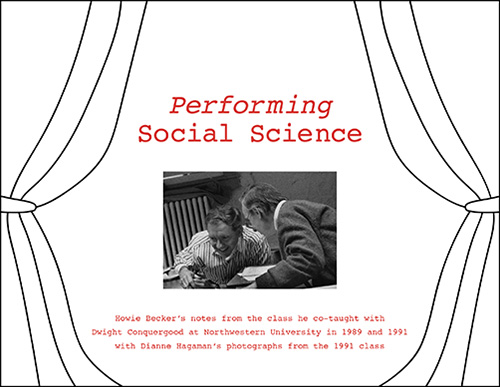 |
Performing Social Science by Howard S. Becker This document contains my notes on the classes in performing social science Dwight Conquergood and I taught at Northwestern University in 1989 and 1991, he in the School of Speech and me in the Sociology Department. We had discovered that we shared an interest in such things and found that there were students who also wanted to give it a try, so it was a natural reflex to give a class together as a way of exploring this territory. We did it twice, the second time joined by my wife, Dianne Hagaman, who photographed the class from start to finish. This wonderful partnership was broken up when Dianne and I took jobs at the University of Washington in Seattle two years later. Dwight and I had always intended to write something about our wonderful experience of giving this class, but Dwight died a few years after Dianne and I left. So, my notes and Dianne’s photographs sat in a box up in our closet until now. |
||
 |
Howard S. Becker: Sociology and Music in the Chicago School by Jean Peneff Who is Howard S. Becker? This book traces his career, examining his work and contributions to the field of sociology. Themes covered include Becker’s theoretical conceptualizations, approaches, teaching style, and positioning in the intellectual milieu. Translated from French by sociologist Robert Dingwall, the English edition benefits from an editorial introduction and additional referencing, as well as a new foreword by Becker himself. |
||
 |
The Sociology of Howard S. Becker: Theory with a Wide Horizon by Alain Pessin Alain Pessin, who unfortunately, for sociology died in 2006, wrote this book about my approach to sociology (which has now been translated from the original French for Anglophone readers). I think he did a great job, but what do I know? Pessin’s text is supplemented with an introduction by William Kornblum, a lengthy conversation between me and Pessin about the ideas of “field” and “world,” and two articles I wrote in tribute to Alain after his death and published here in English for the first time. |
||
 |
Evidence
Sociologists bolster their statements about what’s going on in society with data they offer as evidence for the truth or validity, or what-have-you). Lots of other people do this as well) and the book lists and explains the varieties of errors that result and some safeguards against them. |
||
 |
Thinking Together: An E-Mail Exchange and All That Jazz
An electronic book of the email correspondence of musicians and sociologists Howard Becker and Rob Faulkner during the years they were writing their book for the University of Chicago Press called Do You Know. . .? The Jazz Repertoire in Action. The e-book is published by The Annenberg Press and available from Amazon, the Apple Store, and other places that handle e-books. A paper version of the exchange is published by and available at Questions Théoriques (of course, without the links to almost 300 songs Howie and Rob mention that are included in the electronic version). |
||
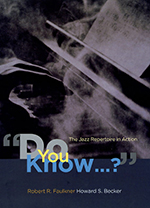 |
“Do You Know...?”: The Jazz Repetoire in Action with Robert R. Faulkner How do musicians who don’t know each other, have never never played together, and have no written music before them, manage to play together in public for hours on end and sound like they’ve been working together for years? The book analyzes the complex social interactions that make it possible and suggests this example as a model for understanding all sorts of other cooperative activities. The years of intellectual communication that led to this book are documented in Thinking Together, described above on this page. |
||
 |
What About Mozart? What About Murder?
Many people think the object of sociological research and theorizing is to simplify our understanding of social life by finding the underlying laws that govern its operation. I think, contrariwise, that the object is to find out the nature of, and make a place in our thinking for, everything that observably contributes to producing the results I’m interested in. Each chapter uses specific cases, mostly work I’ve done and reported on in the past, which exemplify one or another way of doing that and explaining how I did it. The specific cases have an interest of their own, but the emphasis is on what’s to be learned from them about this way of working, and how to do it fruitfully. |
||
 |
Tricks of the Trade
Most books on research methods advise you to state your problem clearly, and then pick the best available method for investigating it. Tricks of the Trade, taking a different approach, advises you to continually revise your problem and your way of investigating it as the research continues. It describes a large number of “tricks” that help you do that more or less painlessly. |
||
 |
Outsiders
Outsiders is the clearest, if not quite the earliest, statement of the “labeling” approach to the study of deviance, the idea that deviance is not a quality of a bad person but the result of someone defining someone’s activity as bad. The idea is illustrated in two chapters on musicians and two on marihuana smoking. |
||
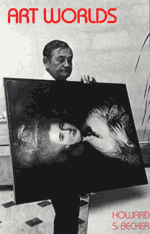 |
Art Worlds
Art Worlds says that art works do not result from the activity of a single artist, but from the coordinated work of a network of cooperating specialists: people who make musical instruments or oil paints or theatrical costumes as well as musicians and composers, painters, and actors, playwrights and directors. And that they manage to do that successfully because they share some ideas and conventions about how the work should be done. |
||
 |
Telling About Society
Social scientists share the work of telling about society with playwrights, novelists, photographers, statisticians, cartographers, and ordinary people, all of whom have some ideas on the subject to express from time to time. Telling About Society explores what’s common to all these endeavors and how they vary depending on the nature of the social organization the telling takes place in. It suggests the surprising conclusion that every way of telling these stories is perfect—for someone in some situation, although never for all people everywhere. |
||
 |
Writing for Social Scientists
Down-home advice on how to avoid the problems of writing that plague students, professors, and everyone who wants to tell what their research has taught them about society. Plenty of advice, plenty of illuminating stories, all designed to make writing more fun and less of a pain. (Some people tell me that just putting the book under their pillow at night cured all their problems, but I don’t believe them.) This new edition brings the chapter on computers up-to-the-minute and comments on length on new developments in academic life that have made writing problems worse than they used to be. |
||
 |
Art From Start to Finish
A handful of specialists from a variety of fields—everything from music to economics—met to discuss the question of when, if ever, is an art work finished. Surprisingly, they agreed that’s it more fruitful to think of art works as continually changing—whether from physical deterioration, editorial changes, differing interpretations, or audiences with new ideas, all of which make the art work something different than it had been. I collaborated with Robert R. Faulkner and Barbara Kirshenblatt-Gimblett to turn the results of our discussion into what I think is a lively and provocative book. |
||
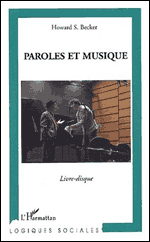 |
Paroles et musique
This book presents French translations of a number of my papers about art and related subjects. And there’s a special bonus—a CD of me playing the piano in duets with bass player Benoit Cancoin (you can’t get this CD anywhere else!) And yes, that’s me in the porkpie hat on the picture on the cover! |
||
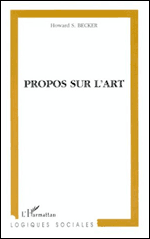 |
Propos sur l’art
More essays on art and related matters in French translation. |
||
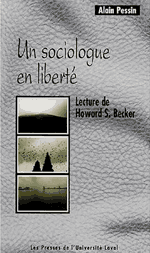 |
Un sociologue en liberté: Lecture d’Howard S. Becker (by Alain Pessin)
Un sociologue en liberté: Lecture d’Howard S. Becker is the only full-length analysis of my ideas about a lot of things, done by a French sociologist who knew my work better than I do. Unfortunately for all of us, Alain Pessin died too young, although he left behind a substantial body of work. |
||
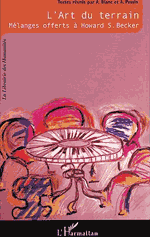 |
L’art du terrain: Mélanges offerts à Howard S. Becker (edited by Alain Blanc and Alain Pessin)
In the United States we call a collection of papers written by scholars to honor one of their own a “festschrift.” In France, it’s called a “mélanges,” and this one was organized for me by two good friends in France. If I say so myself, the papers are pretty interesting, and are by some of the really good sociologists working in France now. |
||
 |
Boys in White
Boys in White reports on a major field study of students at the University of Kansas Medical Center, circa the late 1950s. It’s very detailed and may be somewhat out of date. But people who keep in touch with these things tell me that, for all the minor cosmetic changes in medical education, things are pretty much the same. I don’t know myself. The book introduced the idea of a “perspective” as a technical term referring to the mixture of shared ideas and actions that characterized what we and others called “student culture.” It also made a determined effort to make all the evidence that field work produces available to the reader. |
||
 |
Making the Grade
My colleagues and I continued our exploration of student culture in this overly ambitious study of the home campus of the University of Kansas in Lawrence. We had fun, learned a lot, and developed the idea of the “grade point average perspective,” emphasizing the way everything that students wanted out of their college experience had to be purchased with the currency of academic grades. Whether it was entrance into a professional or graduate school, important positions in campus organizations, or even desirable dates, it all had to be paid for with good grades. That surprised a lot of people, and surprised us too, but that’s the way it was. And, despite all the talk of “grade inflation,” the way it continues to be. |
||